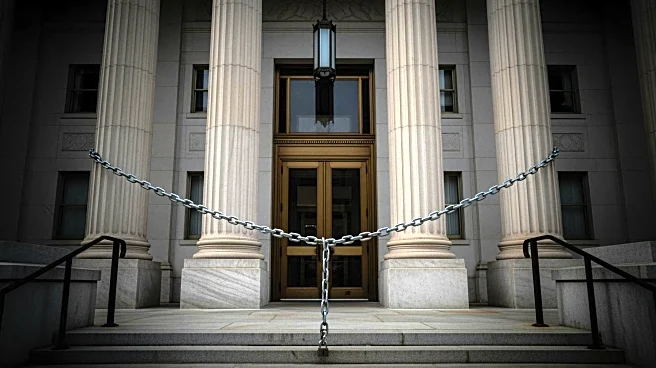What's Happening?
The U.S. government shutdown has reached a record-breaking 36 days, surpassing previous shutdowns in duration. The shutdown began on October 1, 2025, under President Trump, marking the longest in U.S. history. The shutdown has resulted in furloughed federal
employees and halted government operations, with significant economic implications. The Congressional Budget Office estimates the shutdown could cost the economy $14 billion if it continues for another month, with reduced economic output and long-term negative impacts on GDP. The shutdown reflects ongoing challenges in passing appropriations measures and highlights the contentious nature of federal funding negotiations.
Why It's Important?
The prolonged shutdown has significant economic and social consequences, affecting federal employees, government services, and the broader economy. The estimated $14 billion cost underscores the financial strain on the economy, with reduced productivity and potential long-term impacts on GDP. The shutdown highlights the challenges in federal budget negotiations and the political dynamics influencing government operations. It raises concerns about the stability of government functions and the ability to address critical issues without approved funding, affecting public policy and societal well-being.
What's Next?
The resolution of the shutdown depends on negotiations between the Trump administration and Congress to pass appropriations measures. The ongoing impasse may require compromises on contentious issues to restore government operations and address funding gaps. Stakeholders, including federal employees, businesses, and civil society groups, are advocating for a swift resolution to mitigate economic and social impacts. The administration and Congress face pressure to find solutions that balance fiscal responsibility with the need to maintain essential government services.
Beyond the Headlines
The shutdown reflects broader issues in U.S. governance, including the challenges of bipartisan cooperation and the impact of political polarization on policy-making. It raises ethical questions about the prioritization of government functions and the treatment of federal employees during funding lapses. The situation underscores the need for reforms in budgetary processes to prevent future shutdowns and ensure stable government operations. The long-term implications may influence public trust in government and shape future legislative strategies.















